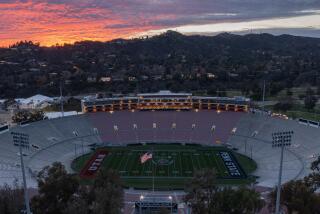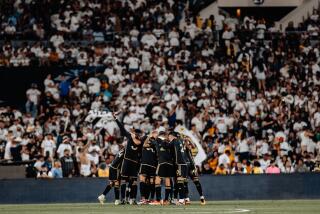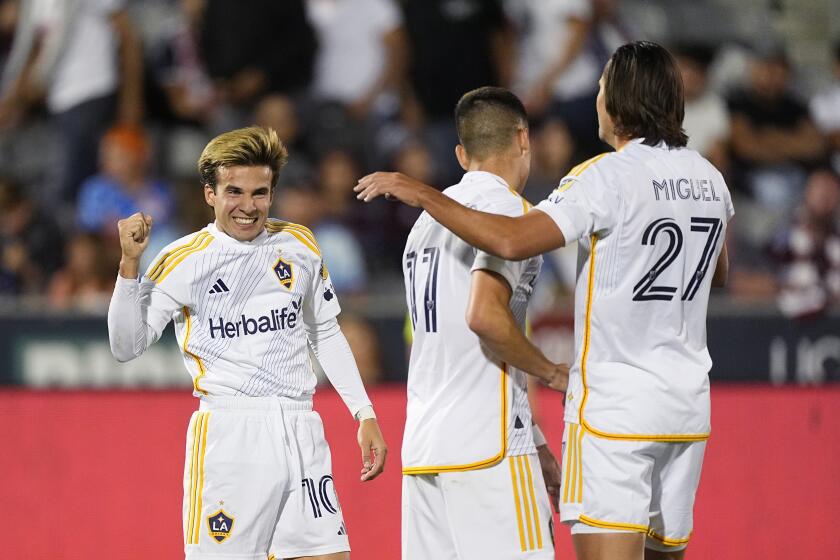Officials Tackled by Super Bowl Ticket Woes
PASADENA — Getting rid of 1,200 Super Bowl tickets set aside for the city by the National Football League would not seem to be a problem.
But it has turned into a public relations nightmare for city officials who have been hounded by requests and even by complaints from recipients who are unhappy with their seats.
Of the 1,200 tickets the city negotiated for the Jan. 25 game, 800 went to the seven members of the Board of Directors and the city manager, who were each allowed to buy 100 of the $75 tickets.
The officials, who paid $7,500 up front for the privilege, resold them at cost to whomever they pleased, including business acquaintances, political supporters and friends, said Mayor John Crowley.
The Tournament of Roses Assn. was allowed to buy 50 tickets. Most of the remaining 350 tickets were distributed to city department heads who held drawings in which various city employees, including police officers, firefighters, clerks and administrators participated.
The city, which was reimbursed by the officials who sold the tickets, sent the NFL a $90,000 check for the 1,200 tickets last week.
The city earlier had promised the league in writing that the tickets would not be sold for more than their $75 face value, and those who bought tickets from city officials were told to abide by that promise.
Ticket brokers are offering the coveted tickets to the long sold-out Denver Broncos-New York Giants game at prices ranging from $500 to $1,500 each.
Pasadena is the only city ever to get Super Bowl tickets directly from the NFL and has received tickets for each of the previous three Super Bowls held here, said Jim Steeg, the NFL’s director of special events.
Fewer Tickets Than Previously
For previous games, the city had received 1,500 tickets, Steeg said.
Instead of being a boon, the Super Bowl tickets have become an albatross around the necks of city officials, who say they are tired of being badgered by the public and the press over their unusually large stock of tickets.
Ironically, several directors say they do not plan to go to the game, either because they do not care about football or cannot afford to buy the tickets for themselves.
Directors say they have gotten a steady stream of requests, starting months ago, and a lifetime of ill will from those who either did not get tickets or were dissatisfied with those they got.
“I find I have fewer friends at the end than I had at the beginning,” said Crowley, who sold his 100 tickets to friends in his district. “I find the whole bloody business a pain. The aggravation and nuisance is a terrible waste of time.”
Nonetheless, said Community Service Agency Director David Jacobs, there has not been enough aggravation to cause any director in memory to turn down the tickets.
City officials have been deluged with questions, mainly from the press, about the propriety of elected officials using Super Bowl tickets for their own public relations.
Although officials stress that there is no illegality in the ticket distribution and that no written accounting is required, Director William Cathey said he could see how some people might perceive the arrangement as a means of trading tickets for political support.
“I don’t think this is a big political plus,” said Cathey. “There’s a perceptual problem here, and maybe it would be better not to do this next time.”
The ticket arrangement between the NFL and the city dates to negotiations for the 1977 Super Bowl, when the NFL was anxious to get a contract for the use of the Rose Bowl with its more than 100,000 seats, Steeg said.
Steeg said that in other cities, it is up to the team that usually plays in the stadium to provide tickets for city officials. But since the Rose Bowl is home to no professional football team, the city’s request for tickets seemed reasonable, Steeg said.
More Tickets Than Other Cities
He added that no team provides its home city as many tickets as the 1,200 Pasadena received.
Steeg said the tickets given to Pasadena were chosen randomly and there are “some on the 50-yard line, but a lot of garbage, too.”
In addition to the tickets allocated to the city of Pasadena, the NFL allotted 1,250 tickets to each of the 24 teams not in the Super Bowl, with the two Los Angeles-area teams, the Rams and the Raiders, getting the option to buy 5,000 tickets each. The two Super Bowl teams each got the rights to 20,000 tickets.
Jacobs, whose agency oversees the Super Bowl contract, said Pasadena’s arrangement with the NFL grew out of a decades-old tradition of setting aside a block of Tounament of Roses parade and game tickets for city officials.
Jacobs said since city directors and the city manager have been able to buy 100 tickets each to the Rose Bowl game for as long as anyone can remember, the practice was simply extended to the Super Bowl contracts for 1977, 1980, 1983 and 1987.
“It was just a standard clause and I put it in,” he said.
City Manager Donald F. McIntyre said there are few guidelines on how the tickets should be distributed but the general feeling is that they are a way to spread good will in the community and pay back the hundreds of volunteers who serve on various city boards, commissions and committees.
However, there are differing opinions among directors on the specifics of spreading good will and repaying volunteers.
Fringe Benefit
Few city officials dispute the rationale behind selling some tickets to city employees to reward them for their work.
But there is disagreement over the tickets that the city manager and the city directors get to distribute as they please.
Director Jess Hughston said he believes the tickets are a fringe benefit for directors, who work long hours and are paid only $50 a meeting.
Hughston said he sold his tickets to residents who either had worked on or donated funds to his reelection campaign. A few tickets also went to friends in the area.
“This is one of our perquisites,” he said. “It gives me a chance to help those who helped me.”
‘Unfair’ Advantage
Hughston added that while it does give him an “unfair” advantage over potential candidates for his seat, “there are very few things I can do for those who helped me.”
Cathey, who was just appointed to the board in December, split his allotment with the board member he replaced, William Bogaard. Cathey said he believes the tickets should go to city volunteers, and he distributed his share to them and some friends.
He said he sold his last two tickets to a woman he did not know from Colorado who called this week and said she was celebrating her 30th wedding anniversary.
“I don’t know if her story was true, but it sounded right,” he said.
Director Rick Cole said the tickets should go to residents in his district who cannot get tickets even though the game is being played in their backyard.
First Come, First Served
Cole announced in his newsletter to constituents that he had tickets available and sold them on a first-come, first-served basis.
“My view is that I’m not any more entitled to those tickets than anyone else,” he said, adding that his system for distributing Super Bowl and Rose Bowl tickets is tedious to administer.
Director Loretta Thompson-Glickman also distributed many of her tickets to residents on a first-come, first-served basis, but said that “about one-fourth” went to clients of Grigsby, Brandford & Co. Inc., the municipal bond underwriting firm for which she works.
Most of the directors and McIntyre, the city manager, said the ticket arrangement is a bother and is often more trouble than it is worth.
First of all, McIntyre said, “Those tickets are not gifts. We have to buy them.”
Recouping Expense
That means each board member and the city manager have to pay for the tickets in advance and recoup the expense by selling them.
McIntyre added there are far more requests than tickets, resulting in bad feelings in all quarters.
“It ends up being a big pain in the neck, really,” he said.
Crowley said he has gotten calls from residents and city officials from all over the country seeking tickets.
“Complete strangers,” he said. “And the tickets have been gone for two or three months now.”
Complaints About Location
Even when a person is graced with a ticket, there is a chance he or she might complain.
Cathey said that for this year’s Rose Bowl game, 80% to 85% of the tickets he distributed were on the goal line or in the end zone.
“Those people get mad at you later,” he said.
After all the anxious phone calls and pleading for tickets, several directors said they will not attend the game.
Cathey said he was not that interested. Hughston said he could not afford the $75. Crowley said he was thinking of going to the game but ended up selling his last tickets.
“I will probably be sitting at home with a brew, watching the game,” he said.
‘Don’t Understand the Brouhaha’
Crowley said questions about the ticket arrangement, which have come mainly from the press, have surfaced each time the city plays host to the Super Bowl.
“I find the press coverage so redundant,” he said. “Frankly, I don’t understand the brouhaha.”
Cathey said he favored reviewing the arrangement if Pasadena hosts the Super Bowl again, and “if it is more trouble than it’s worth, then the heck with it.”
Houston added that the perennial hoopla over the tickets makes him favor changing the arrangement.
“I hope this causes us to do something about it,” he said. “I would think we would just as soon not do this.”
Thompson-Glickman said she has heard the same complaints before and wonders if anyone is seriously interested in changing the arrangement.
“If it’s a hassle, there hasn’t been anyone who has spoken up to change it,” Thompson-Glickman said. “And we’ve had this process for years.”
More to Read
Go beyond the scoreboard
Get the latest on L.A.'s teams in the daily Sports Report newsletter.
You may occasionally receive promotional content from the Los Angeles Times.











